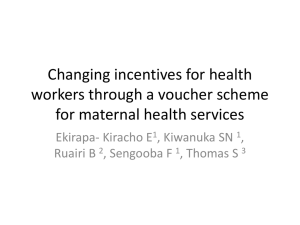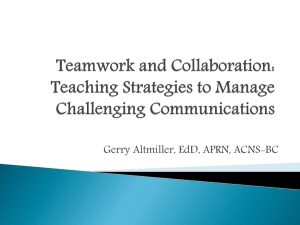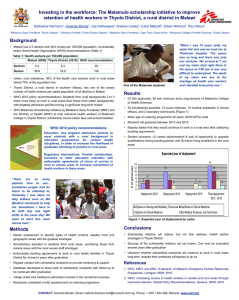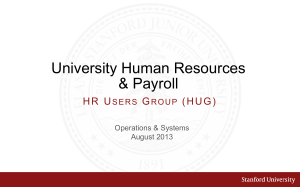The implementation challenges of Improving
advertisement
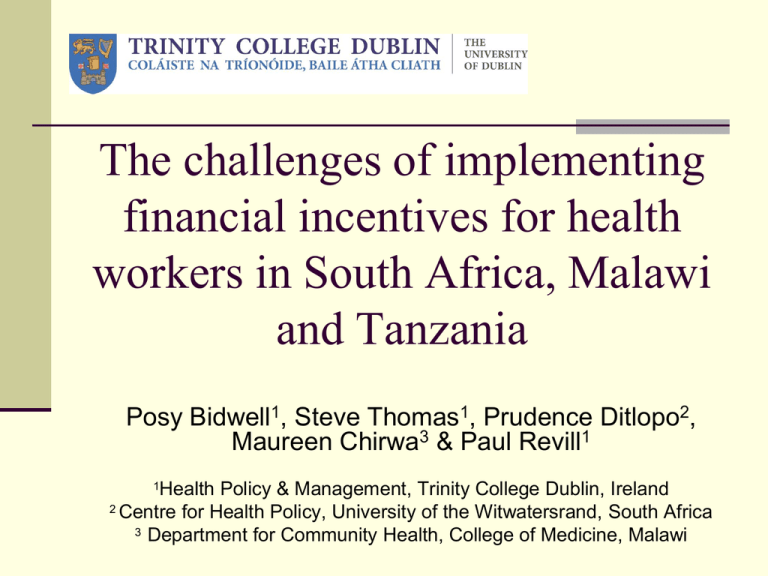
The challenges of implementing financial incentives for health workers in South Africa, Malawi and Tanzania Posy Bidwell1, Steve Thomas1, Prudence Ditlopo2, Maureen Chirwa3 & Paul Revill1 Health Policy & Management, Trinity College Dublin, Ireland 2 Centre for Health Policy, University of the Witwatersrand, South Africa 3 Department for Community Health, College of Medicine, Malawi 1 Issues Financial incentives are a popular strategy to address the HRH crisis The Motivation Project evaluated incentive initiatives that currently being implemented in South Africa, Malawi and Tanzania Despite the financial incentives: 96% in Tanzania reported the salary they received was not proportional to the work they did ‘moonlighting’ a source of income for ¼ HWs in Malawi Only 1/3 in SA satisfied with the incentives Aim To explore the processes involved in implementing financial incentives To use Hogwood & Gunn’s (1984) conditions for implementation to be successful, e.g. Sufficient time and resources Evidence based policy Clear objectives Clear communication In order to identify barriers to implementation Brief description of the financial incentives South Africa 2004: Rural Allowance (8-22% annual salary) 2004: Scarce Skills (10-15% annual salary) 2007 Occupational Specific Dispensation (salary adjustment of 20-80%) Tanzania 2006 Salary increase (122-178%) Malawi 2005 Salary top-up (52%) SA: Positive outcomes Partially successful in enticing health professionals “since our nurses started getting rural allowance we were able to attract more nurses” (Hospital Manager) “the OSD made a huge difference because we are able to recruit people from private sector” (Hospital Manager) Some understanding that those who were specialised deserved to get it “ I don’t have the skills so I don’t deserve to get it (scare skills allowance” (EN) SA: Negative outcomes Divisive “Rural Allowance is only paid to professional nurses. Enrolled nurses and assistant nurses are not getting it” (Enrolled Nurse) “We all work in theatre with that trained theatre nurse and I am not a trained theatre nurse, but we are doing the same job” (Professional Nurse) Temporary effect “ You give people Rural Allowance but salary excites you only for the first 3-4 months. And we know the more you earn the more you want” (Hospital Manager) Lack of uniformity “it was not implemented correctly because the declaration of what is rural depended on the provinces”, (Policy Maker) Does not serve to attract HWs “If I work in Kimberly I get it, if I work in Cape Town I get scarce skills. So that would not attract anyone from Cape Town to work at this place” (GP) Erosion of team spirit “You find that nurses who used to be good are very aggressive now just because they did not get anything” (PN) South Africa: Implementation challenges Rural Allowance Scarce Skills OSD • • • • • • • • • • • High degree of anticipation • “Rushed” implementation • Lack of clarity • Lack of communication • Not outcome orientated • Not evidence based • No systems for M&E Definition of ‘rural’ Not outcome orientated Excluded junior nurses Lack of communication No systems for M&E Excluded some cadres Not evidence based Not outcome orientated Lack of communication No systems for M&E “I cannot say if they have been effective because we haven’t done any research” Policy maker Implementation conditions that were commonly not fulfilled in all 3 countries Poor Communication High degree of anticipation for OSD Tax on 52% top ups Implemented at a time of poor relations Tanzania salary top ups implemented following strike action Lack of consistency Definition of ‘rural’ left to province’s discretion Tanzanian salary increases Evidence based? Key Lessons Salary is an important invention (Bennett et al. 2000) Better paid providers: Don’t look for other jobs Don’t supplement income through other means (Dieleman et al 2003, Kyaddondo & Whyte 2003) However: Careful timing is needed Need to prepare for any fall-out The implementation process can weaken the impact of the policy Communication is key! Financial incentives are highly sensitive Clear communication is vital in order to manage expectations “There was no clear communication to the nursing profession resulting in confusion. And even managers within the health services found it difficult to understand. As a result, when nurses queried whether they are eligible or not, the responses they got were often not helpful”. (Policy-Maker) Acknowledgements The Motivation Project Team The Motivation Project was funded by Irish Aid and administered through the Health Research Board.


